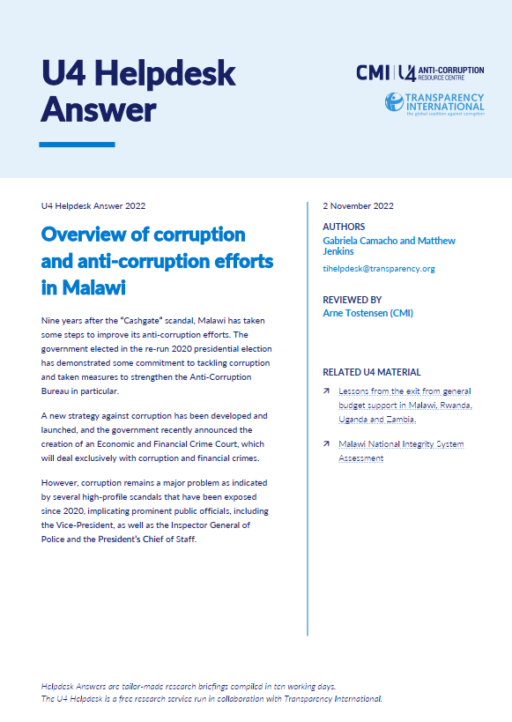
This Anti-Corruption Helpdesk brief was produced in response to a query from a U4 Partner Agency. The U4 Helpdesk is operated by Transparency International in collaboration with the U4 Anti-Corruption Resource Centre based at the Chr. Michelsen Institute.
Query
Please provide an overview of corruption and anti-corruption efforts in Malawi, including the institutional landscape and legal framework.
Summary
Nine years after the “Cashgate” scandal, Malawi has taken some steps to improve its anti-corruption efforts. The government elected in the re-run 2020 presidential election has demonstrated some commitment to tackling corruption and taken measures to strengthen the Anti-Corruption Bureau in particular.
A new strategy against corruption has been developed and launched, and the government recently announced the creation of an Economic and Financial Crime Court, which will deal exclusively with corruption and financial crimes.
However, corruption remains a major problem as indicated by several high-profile scandals that have been exposed since 2020, implicating prominent public officials, including the Vice-President, as well as the Inspector General of Police and the President’s Chief of Staff.
Main points
- In 2019, the presidential election was marred by massive irregularities and the results were annulled by the Constitutional Court. In the fresh presidential elections in 2020, an alliance by the Malawi Congress Party and the United Transformation Movement under the label of ‘Tonse’ was elected on an anti-corruption platform.
- The fallout from the 2013 ‘Cashgate’ scandal continues to cast a long shadow over debates about corruption in the country.
- The second five-year National Anti-Corruption Strategy (NACS II) was launched in 2020, after a seven-year hiatus from the previous NACS, which ended in 2013.
- NACS II adopts a participatory, multi-stakeholder approach and its design involved extensive consultations with all three branches of government, civil society, the private sector, faith-based organisations as well as the mass media, youth, academia, and women’s organisations.
- The Anti-Corruption Bureau has enjoyed some recent successes in investigating corruption cases and making arrests.
Contents
- Background
- Extent of corruption
- Legal and institutional anti-corruption framework
- Other stakeholders
- References
Authors
Gabriela Camacho and Matthew Jenkins ([email protected])
Reviewer
Arne Tostensen (CMI)
Date
15/12/2022
Tags
 Download PDF
Download PDF
